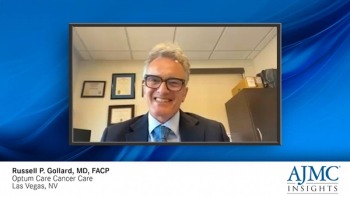
Russell P. Gollard, MD, FACP, discusses hemophilia patients in their plan, identifying these patients, and treatment with newer monoclonal factor products.

Russell P. Gollard, MD, FACP, discusses hemophilia patients in their plan, identifying these patients, and treatment with newer monoclonal factor products.

Russell P. Gollard, MD, FACP, discusses coverage decisions for expensive treatments in hemophilia, including total cost of care, drug availability, and real-world evidence.

Russell P. Gollard, MD, FACP, analyzes the role of ICER reports in optimizing patient care and health care costs.

Russell P. Gollard, MD, FACP, discusses ways to ensure access to appropriate treatment for rare diseases like hemophilia A, such as finding motivated providers with expertise and using utilization management strategies for cutting-edge care to bridge the gap between available community treatments and emerging therapies, ultimately benefiting patients.

Russell P. Gollard, MD, FACP, discusses how the rising costs of managing hemophilia A are influenced by drug expenses, treatment efficacy, and adverse events, creating significant financial burdens across health care settings and patient populations.

Russell P. Gollard, MD, FACP, explores effective collaboration among health care professionals, administrators, and specialty pharmacies in managing rare diseases like hemophilia A.

Russell P. Gollard, MD, FACP, discusses strategies for mitigating the high costs of expensive medications, addressing concerns of medication waste and hoarding.

Russell P. Gollard, MD, FACP, highlights the impact of recent advances in hemophilia A treatment on formulary decisions and management approaches.

Explore the prevalence of hemophilia A in the United States and its profound clinical impact on patients, delving into the challenges and implications of managing this bleeding disorder. Additionally, gain valuable insights into the economic costs associated with the comprehensive care required for individuals with hemophilia A, shedding light on the financial burdens faced by both patients and healthcare systems.

Allison Wheeler, MD, explores the transformative journey of hemophilia A treatment, from blood products to advanced recombinant factor therapies, longer half-life products, and subcutaneous injections, that have revolutionized care.

Understand key factors influencing hemophilia A treatment decisions and explore the impact of prophylactic vs on-demand therapy on efficacy, safety, and patient outcomes, including joint health, bleeding episodes, and quality of life in severe cases.

Allison Wheeler, MD, delves into the complexities of prophylaxis for mild to moderate hemophilia A cases, exploring a patient-centric approach, situational prophylaxis during high-risk activities, and best practices in mitigating joint bleeds.

Explore the sequelae of nonadherence to prophylactic treatment in hemophilia A and discover strategies for enhancing treatment adherence and overcoming challenges through interdisciplinary collaborations.

Steven W. Pipe, MD, explores the latest developments in hemophilia A treatments and prophylactic therapies, including extended half-life agents and a groundbreaking bispecific antibody.

An expert explores the safety profiles of factor replacement therapies and emicizumab in hemophilia A, covering adverse events, risks, and long-term safety considerations.

Steven W. Pipe, MD, discusses real-world evidence comparing factor replacement to emicizumab in hemophilia A, exploring efficacy, adherence, and cost considerations.

An expert explains the unique dosing considerations for emicizumab compared to factor VIII in hemophilia A, covering prophylaxis and breakthrough bleeding scenarios.

Steven W. Pipe, MD, shares insights on optimizing hemophilia treatment schedules and minimizing hoarding of factor VIII prophylaxis or emicizumab for improved patient adherence.

Steven W. Pipe, MD, discusses Altuviiio and Roctavian, the latest hemophilia A therapies, exploring eligibility, benefits, and potential impacts on prophylaxis, surgeries, and breakthrough bleeding.

Steven W. Pipe, MD, explores the potential advantages and challenges of fitusiran, a promising small interfering RNA therapy for hemophilia A, discussing its subcutaneous nature, low administration burden, and how it fits into the evolving treatment landscape.

259 Prospect Plains Rd, Bldg H
Cranbury, NJ 08512
© 2025 MJH Life Sciences®
All rights reserved.
